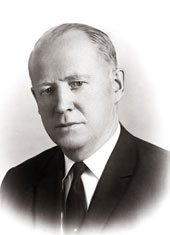
Valentin Sergeyevich Pavlov was a Soviet official who became a Russian banker following the dissolution of the Soviet Union. Born in the city of Moscow, then part of the Russian Soviet Federative Socialist Republic, Pavlov began his political career in the Ministry of Finance in 1959. Later, during the Brezhnev Era, he became head of the Financial Department of the State Planning Committee. Pavlov was appointed to the post of Chairman of the State Committee on Prices during the Gorbachev Era, and later became Minister of Finance in Nikolai Ryzhkov's second government. He went on to succeed Ryzhkov as head of government in the newly established post of Prime Minister of the Soviet Union.

Andrei Aleksandrovich Zhdanov was a Soviet politician. He was the Soviet Union's "propagandist-in-chief" after the Second World War, and was responsible for developing the Soviet cultural policy, the Zhdanov Doctrine, which remained in effect until the death of Joseph Stalin. Zhdanov was considered Stalin's most likely successor but died before him.

Vasily Vasilyevich Kuznetsov was a Russian Soviet politician who acted as Chairman of the Presidium of the Supreme Soviet of the Soviet Union from 1982 to 1983, for a second time in 1984, and for a third time in 1985. He was one of the oldest members of the Communist Party of the Soviet Union.
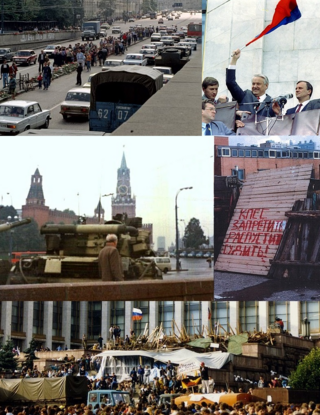
The 1991 Soviet coup d'état attempt, also known as the August Coup, was a failed attempt by hardliners of the Communist Party of the Soviet Union (CPSU) to forcibly seize control of the country from Mikhail Gorbachev, who was Soviet President and General Secretary of the CPSU at the time. The coup leaders consisted of top military and civilian officials, including Vice President Gennady Yanayev, who together formed the State Committee on the State of Emergency (GKChP). They opposed Gorbachev's reform program, were angry at the loss of control over Eastern European states and fearful of the New Union Treaty, which was on the verge of being signed by the Soviet Union (USSR). The treaty was to decentralize much of the central Soviet government's power and distribute it among its fifteen republics; Yeltsin's demand for more autonomy to the republics opened a window for the plotters to organize the coup.

Sergey Fyodorovich Akhromeyev was a Soviet military figure, Hero of the Soviet Union (1982) and Marshal of the Soviet Union (1983).
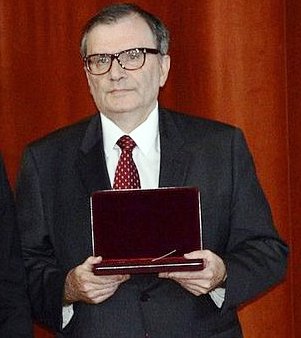
Georgiy Enverovich Mamedov is a Russian diplomat of Azerbaijani descent, and one of Russia's foremost authorities on the United States and Canada. In the 1990s and the early 2000s, he was his country's chief interlocutor with the United States on such subjects as NATO, arms control and Kosovo.
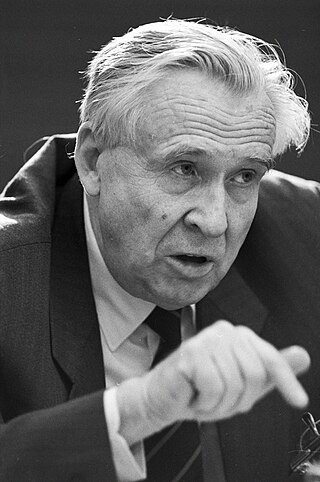
Vladimir Mikhailovich Vinogradov was a prominent Soviet diplomat in the second half of the 20th century.
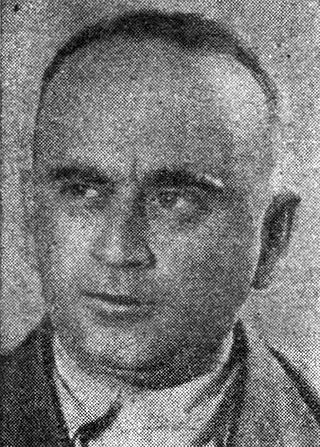
Vladimir Georgievich Dekanozov was a Soviet senior state security operative and diplomat.

Kanat Bekmyrzauly Saudabayev is a Kazakh politician who served as the State Secretary of Kazakhstan from 2007 to 2012. Prior to that, he served as the Minister of Foreign Affairs from 2009 to 2011 and in 1994, Ambassador of Kazakhstan to the United States from 2000 to 2007, Ambassador to the United Kingdom from 1996 to 1999 and Ambassador to Turkey from 1994 to 1996.

Andrey Andreyevich Smirnov, , was a Soviet career diplomat.
Ost-West Handelsbank AG (OWH) was a Soviet-controlled bank in Frankfurt established in 1971. It was acquired by VTB Bank and changed its name to VTB Bank Deutschland on 30 September 2006.

Fedor Tarasovich Gusev was a Soviet diplomat.

Ivan Vasilyevich Samylovskii (Samylovsky) (Russian: Иван Васильевич Самыловский; 5 September 1905 – 29 November 1971) was a Soviet diplomat, politician and journalist. He held the diplomatic rank of Ambassador Extraordinary and Plenipotentiary. He was also the Head of the Department of the Near East of the USSR Ministry for Foreign Affairs (before 1946 known as NKID, i.e. People's Commissariat for Foreign Affairs). In his work he specialized in China, Turkey, Afghanistan, Near and Middle East (including the Palestine question 1944-1947) and the countries of Africa. He is historically known as a leading Soviet specialist in Soviet-Chinese relations.

Sergei Matveevich Shtemenko was a Soviet general who served as the Chief of the Soviet Armed Forces' General Staff from 1948 to 1952.
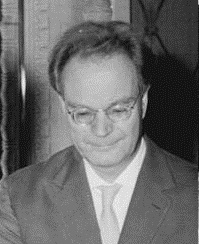
Mikhail Georgiyevich Pervukhin was a Soviet official during the Stalin Era and Khrushchev Era. He served as a First Deputy Chairman of the Council of Ministers, literally First Vice-Premier of the Soviet Union, from 1955 to 1957.
The year 1991 was marked by many events that left an imprint on the history of Soviet and Russian Fine Arts. After the opening of the former Soviet Union to the world, it started to show to the world more of its arts.

The Declaration and Treaty on the Formation of the Union of Soviet Socialist Republics officially created the Union of Soviet Socialist Republics (USSR), commonly known as the Soviet Union. It de jure legalised a political union of several Soviet republics that had existed since 1919 and created a new federal government whose key functions were centralised in Moscow. Its legislative branch consisted of the Congress of Soviets of the Soviet Union and the Central Executive Committee of the Soviet Union (TsIK), while the Council of People's Commissars composed the executive.
Sergei Alekseyevich Zverev was a Soviet politician who served as the Defence Industry Minister from 1965 to 1978).
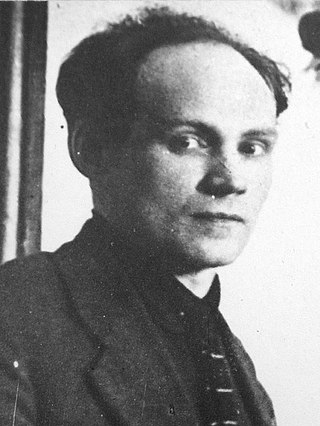
Nikolai Kirillovich Antipov was a Soviet politician. He was appointed Member of the Central Executive Committee of the Soviet Union and elected member of the Central Committee of the Communist Party of the Soviet Union (1924–1937) and candidate member of the Orgburo. He was executed during the Great Purge and rehabilitated posthumously.

Aleksandr Antonovich Troyanovsky was a Russian revolutionary, military officer and Soviet diplomat who served as the first authorized Soviet Ambassador to the United States.
